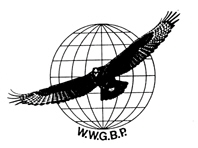|
B.-U. Meyburg & R. D. Chancellor (eds.) 1989
RAPTORS IN THE MODERN WORLD
Download of articles ... Click here
Proceedings of the 3rd World Conference on Birds of Prey and Owls
WWGBP, Berlin, London and Paris
ISBN 3-9801961-0-0, 612 pp.
"The editors of this conference proceedings are to be congratulated for
such an excellently produced, interesting and attractive volume. It is packed with information, containing 72 papers in
8 sections by 112 authors from 27 countries, and concluding with the 12 resolutions passed by the conference.
Like all conference proceedings, the papers are varied in scope and content, ranging from little more than abstracts,
to some fairly weighty ones with new information or synthesis.
The first section covers ‘Raptors on migration and wintering grounds’, a particularly difficult aspect of their annual
cycle to study, but many of the 19 papers are simply lists of raptors migrating through, or wintering in, different areas.
The next 3 sections are ‘Population biology and breeding’ (a very meaty series of 10 papers, including Sparrowhawk (Newton),
Golden Eagle (Watson & Langslow), Kestrel (Village) and Osprey (Poole)), and the biology and conservation of rare diurnal
raptors (14 papers) and owls (10 papers).
The 11 papers of section 5 considering ‘Raptors in Polluted Environments’ cover fluorosis, lead, mercury and PCBs but the
main emphasis is still on organochlorine pesticides. A very important paper by Davies & Randall shows how eggshell
thinning in the African Fish Eagle is correlated with DDT levels in southern African watersheds which, in turn, is associated
with differing levels of cotton production. Furthermore, they have shown that inland eggshells are naturally thinner
than those from marine areas, thus casting doubts on previous investigations of eggshell thinning that have failed to take
this into account. Another paper (Furness et al.) shows how Golden Eagles that feed on seabirds in western
Scotland accrue high pollutant burdens and suffer low reproductive success.
Three short sections on habitat analysis and census techniques (4 papers), promotion of legislation (4), and education in
raptor conservation (10 abstracts) conclude an important worldwide contribution to raptor research and
conservation."
Humphrey Crick (Review in Bird Study, 37, 1990, p.70)
|
|
 Welcome
Discussion Groups
Publications
Conservation Studies on Raptors (1985)
Birds of Prey Bulletin No. 3 (1986)
Birds of Prey Bulletin No. 4 (1991)
Raptor Conservation Today (1994)
Eagle Studies (1996)
Holartic Birds of Prey (1998)
Raptors at Risk (2000)
Raptors Worldwide (2004)
Conferences
Resolutions
Contact
Impressum [in German]
Welcome
Discussion Groups
Publications
Conservation Studies on Raptors (1985)
Birds of Prey Bulletin No. 3 (1986)
Birds of Prey Bulletin No. 4 (1991)
Raptor Conservation Today (1994)
Eagle Studies (1996)
Holartic Birds of Prey (1998)
Raptors at Risk (2000)
Raptors Worldwide (2004)
Conferences
Resolutions
Contact
Impressum [in German]